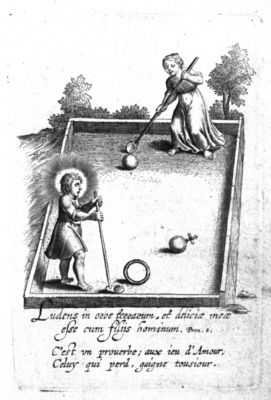Ludovicus van Leuven, Amoris divini et humani antipathia (1629)
Table of contents ↑Lusus Amoris [48]

VI.
Hugo.
TOtus orbis terræ est quasi quidam ludus glo-
bi aut pilæ; quæmodo ab illo tenetur, modo
ad illum proijcitur, & aliquando diuiditur in par-
tes, & ille vnam partem habet & alius aliam. Sic
fit de orbe; primò fuit monarchia apud Assyrios,
& postea quasi pila aut globus proiectus venit ad
Persas & Medos, postea ad Græcos, postea ad Ro-
manos, modò diuisa est pila; quis est qui proiecit
& reiecit toties illam pilam aut globum? nonne
Amor? sed amor inordinatus, qui proijcit vt diui-
dat, reijcit vt destruat. Amor hic diuinus proijcit
& globum, globum monarchiæ Ecclesiasticæ;
proijcit, sed semper ad vnum & idem: vnum (in-
quam) & idem gremium Ecclesiæ, vnum & idem
caput, quod est summus Pontifex. proijcit vt cu-
stodiat, proijcit vt defendat.
TOtus orbis terræ est quasi quidam ludus glo-
bi aut pilæ; quæmodo ab illo tenetur, modo
ad illum proijcitur, & aliquando diuiditur in par-
tes, & ille vnam partem habet & alius aliam. Sic
fit de orbe; primò fuit monarchia apud Assyrios,
& postea quasi pila aut globus proiectus venit ad
Persas & Medos, postea ad Græcos, postea ad Ro-
manos, modò diuisa est pila; quis est qui proiecit
& reiecit toties illam pilam aut globum? nonne
Amor? sed amor inordinatus, qui proijcit vt diui-
dat, reijcit vt destruat. Amor hic diuinus proijcit
& globum, globum monarchiæ Ecclesiasticæ;
proijcit, sed semper ad vnum & idem: vnum (in-
quam) & idem gremium Ecclesiæ, vnum & idem
caput, quod est summus Pontifex. proijcit vt cu-
stodiat, proijcit vt defendat.

Ieu de l'Amour.
VI.
Dis moy, amour, que fais tu dans le monde?
Ie fais rouler ceste machine ronde,
Ie fais iouer tous les ressorts du ciel:
C'est moy, qui fais naistre des feux & flames,
C'est moy, qui fais perdre & gaigner les ames,
Et qui leur donne vn ieu perpetuel.
VI.
Dis moy, amour, que fais tu dans le monde?
Ie fais rouler ceste machine ronde,
Ie fais iouer tous les ressorts du ciel:
C'est moy, qui fais naistre des feux & flames,
C'est moy, qui fais perdre & gaigner les ames,
Et qui leur donne vn ieu perpetuel.
Translations
 |
Play of love. |
 |
Playing in the world; and my delights are with the sons of men. |
Sources and parallels
-
Possibly based on, field borders and background landscape added, in: Lusus amoris. [32]
 (in: anonymous, Amoris divini et humani antipathia (1628)
(in: anonymous, Amoris divini et humani antipathia (1628) )
[Compare
)
[Compare ]
]
-
Same copperplate, slightly altered, in: Liefde is de beste leermeester [22]
 (in: Willem den Elger, Zinne-beelden der liefde (1703)
(in: Willem den Elger, Zinne-beelden der liefde (1703) )
[Compare
)
[Compare ]
]
-
Remake of image, not mirrored, wings of Amor divinus removed, female figure as Anima taking place of Amor humanus,
in: Hâc vincitur, illâc perditur [26]
 (in: anonymous, Typus mundi (1627)
(in: anonymous, Typus mundi (1627) )
[Compare
)
[Compare ]
]
References, across this site, to this page:
- Lusus amoris. [32]
 (in: anonymous, Amoris divini et humani antipathia (1628)
(in: anonymous, Amoris divini et humani antipathia (1628) )
)
- Liefde is de beste leermeester [22]
 (in: Willem den Elger, Zinne-beelden der liefde (1703)
(in: Willem den Elger, Zinne-beelden der liefde (1703) )
)
- Pila mundus Amorum est. [1]
 (in: Daniël Heinsius, Ambacht van Cupido (1613)
(in: Daniël Heinsius, Ambacht van Cupido (1613) )
)
- Pila mundus Amorum est. [1]
 (in: Daniël Heinsius, Ambacht van Cupido, from: Nederduytsche poemata (1616)
(in: Daniël Heinsius, Ambacht van Cupido, from: Nederduytsche poemata (1616) )
)
- Hâc vincitur, illâc perditur [26]
 (in: anonymous, Typus mundi (1627)
(in: anonymous, Typus mundi (1627) )
)

